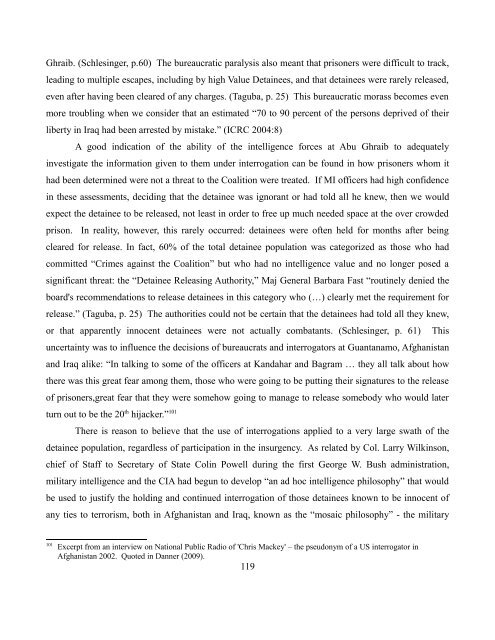The Torturer's Dilemma: Analyzing the Logic of Torture for Information
The Torturer's Dilemma: Analyzing the Logic of Torture for Information
The Torturer's Dilemma: Analyzing the Logic of Torture for Information
You also want an ePaper? Increase the reach of your titles
YUMPU automatically turns print PDFs into web optimized ePapers that Google loves.
Ghraib. (Schlesinger, p.60) <strong>The</strong> bureaucratic paralysis also meant that prisoners were difficult to track,<br />
leading to multiple escapes, including by high Value Detainees, and that detainees were rarely released,<br />
even after having been cleared <strong>of</strong> any charges. (Taguba, p. 25) This bureaucratic morass becomes even<br />
more troubling when we consider that an estimated “70 to 90 percent <strong>of</strong> <strong>the</strong> persons deprived <strong>of</strong> <strong>the</strong>ir<br />
liberty in Iraq had been arrested by mistake.” (ICRC 2004:8)<br />
A good indication <strong>of</strong> <strong>the</strong> ability <strong>of</strong> <strong>the</strong> intelligence <strong>for</strong>ces at Abu Ghraib to adequately<br />
investigate <strong>the</strong> in<strong>for</strong>mation given to <strong>the</strong>m under interrogation can be found in how prisoners whom it<br />
had been determined were not a threat to <strong>the</strong> Coalition were treated. If MI <strong>of</strong>ficers had high confidence<br />
in <strong>the</strong>se assessments, deciding that <strong>the</strong> detainee was ignorant or had told all he knew, <strong>the</strong>n we would<br />
expect <strong>the</strong> detainee to be released, not least in order to free up much needed space at <strong>the</strong> over crowded<br />
prison. In reality, however, this rarely occurred: detainees were <strong>of</strong>ten held <strong>for</strong> months after being<br />
cleared <strong>for</strong> release. In fact, 60% <strong>of</strong> <strong>the</strong> total detainee population was categorized as those who had<br />
committed “Crimes against <strong>the</strong> Coalition” but who had no intelligence value and no longer posed a<br />
significant threat: <strong>the</strong> “Detainee Releasing Authority,” Maj General Barbara Fast “routinely denied <strong>the</strong><br />
board's recommendations to release detainees in this category who (…) clearly met <strong>the</strong> requirement <strong>for</strong><br />
release.” (Taguba, p. 25) <strong>The</strong> authorities could not be certain that <strong>the</strong> detainees had told all <strong>the</strong>y knew,<br />
or that apparently innocent detainees were not actually combatants. (Schlesinger, p. 61) This<br />
uncertainty was to influence <strong>the</strong> decisions <strong>of</strong> bureaucrats and interrogators at Guantanamo, Afghanistan<br />
and Iraq alike: “In talking to some <strong>of</strong> <strong>the</strong> <strong>of</strong>ficers at Kandahar and Bagram … <strong>the</strong>y all talk about how<br />
<strong>the</strong>re was this great fear among <strong>the</strong>m, those who were going to be putting <strong>the</strong>ir signatures to <strong>the</strong> release<br />
<strong>of</strong> prisoners,great fear that <strong>the</strong>y were somehow going to manage to release somebody who would later<br />
turn out to be <strong>the</strong> 20 th hijacker.” 101<br />
<strong>The</strong>re is reason to believe that <strong>the</strong> use <strong>of</strong> interrogations applied to a very large swath <strong>of</strong> <strong>the</strong><br />
detainee population, regardless <strong>of</strong> participation in <strong>the</strong> insurgency. As related by Col. Larry Wilkinson,<br />
chief <strong>of</strong> Staff to Secretary <strong>of</strong> State Colin Powell during <strong>the</strong> first George W. Bush administration,<br />
military intelligence and <strong>the</strong> CIA had begun to develop “an ad hoc intelligence philosophy” that would<br />
be used to justify <strong>the</strong> holding and continued interrogation <strong>of</strong> those detainees known to be innocent <strong>of</strong><br />
any ties to terrorism, both in Afghanistan and Iraq, known as <strong>the</strong> “mosaic philosophy” - <strong>the</strong> military<br />
101 Excerpt from an interview on National Public Radio <strong>of</strong> 'Chris Mackey' – <strong>the</strong> pseudonym <strong>of</strong> a US interrogator in<br />
Afghanistan 2002. Quoted in Danner (2009).<br />
119
















